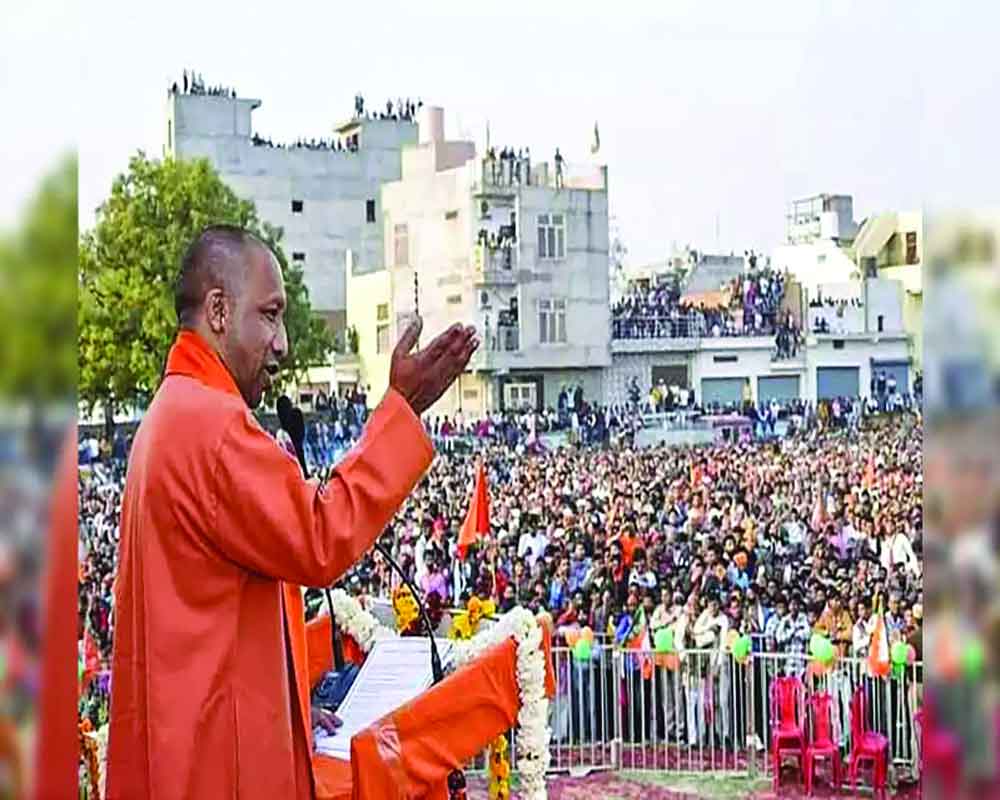The silence of those feeling relieved at the mafia don’s death is much louder than those grieving it
It is often said that sometimes silence is more deafening than cranking noise. At the burial of mafia don-turned-politician Mukhtar Ansari in Mohammadabad of Ghazipur district of eastern Uttar Pradesh, there was an estimated crowd of around 30,000 mourners, or more perhaps, who raised the slogan of “mafia nahi messiah hain” (he was not a mafia, he was a messiah). Similar moments of outbursts, although not of the same magnitude, were witnessed when another mafia-don-turned-politician of Uttar Pradesh Atiq Ahmed was killed.
Top Uttar Pradesh Opposition leaders, meanwhile, have demanded a high-level investigation into the death of the jailed gangster-turned politician Mukhtar Ansari, with the Samajwadi Party (SP) president Akhilesh Yadav even calling for an investigation under the supervision of a Supreme Court Judge. Similarly, with an eye on minority votes, four-time former UP CM and the Bahujan Samaj Party (BSP) president Mayawati, too, has demanded a high-level investigation into the death in view of the serious allegations by the family of the deceased that he was in fact poisoned.
Opposition leaders have alleged that Uttar Pradesh is going through the worst phase of ‘government anarchy’. To which, many residing in the State may not agree. Ansari, for decades, was regarded as one of eastern UP’s most dreaded gangsters, a reign that involved deadly rivalries with other gangster-politicians, some of whom he and his associates have been accused or convicted of having assassinated. He was lodged in different prisons in Punjab and Uttar Pradesh since 2005, when he was first arrested for inciting violence.
His political career saw him represent the Mau Vidhan Sabha seat for five terms, winning it for the first time as a Bahujan Samaj Party (BSP) candidate. He was subsequently expelled from the party but continued to win the seat — in 2002 and 2007 — as an independent, and in 2012 under the banner of his party Quami Ekta Dal — before he rejoined the BSP in 2017. In 2022, his son took over from the father and contested and won the Mau Vidhan Sabha seat.
The silence of those feeling relieved at the death of Ansari is much louder than those grieving it. Although there are no indications of the State being involved in the death of the jailed-politician, the silent masses are giving credit to the resolute administration of Uttar Pradesh Chief Minister Yogi Adityanath for the mafia don exiting the political scene ahead of the Lok Sabha polls.
Ansari was accused in 63 criminal cases, including 14 of murder.
These cases remained pending in the court of law till Yogi Adityanath came to power as Chief Minister in 2017. Slowing the legal process gained pace and Ansari was convicted and sentenced in eight of these since September 2022. Among the most high profile of these cases were the murders of then sitting Bharatiya Janata Party (BJP) MLA Krishnanand Rai in 2005 and Awadesh Rai (brother of current Uttar Pradesh Congress president Ajay Rai) in 1991. The battle between the Rais (not directly related) and the Ansaris was about hegemony in the award of the Government contracts and the huge profits it brought.
The garnering of the contracts needed use of terror and if missed out, unleashing threats of extortion.
The gang wars were not limited to just the Ghazipur district but spread their tentacles to almost all the districts of Uttar Pradesh, east of the State capital of Lucknow.
In the State which gives 80 Members of Parliament to the 545-strong Lok Sabha, the determination of the present Chief Minister to exterminate gangsters has to a great extent restored people’s faith in the law and order machinery. Silent accolades for a Government into the seventh year of its rule, is bound to reap a huge political harvest.
The death of Mukhtar Ansari may have made things more difficult for the Samajwadi Party-led Opposition. It will not bring any fresh consignments of minority votes, as they stand already consolidated behind them, but it would certainly send a firm message to law-abiding citizens about the ‘effectiveness’ of the Yogi Adityanath Government.
There are still images in the minds of the local residents of Ansari moving around in an open vehicle, flaunting firearms in a communally affected town under curfew. Government bulldozers pulling down concrete emblems of Ansari’s empire — events that preceded his death — restored people’s faith and belief in the Government machinery. Yogi Adityanath’s bulldozers may, at times, seem to have crossed the line but they have been largely effective in restoring a sense of confidence in even among those who may not have been much swayed by the passion surrounding the inauguration of the Ram Mandir at Ayodhya. Therefore, Ansari, in his death, may give just that decisive advantage to the BJP in Uttar Pradesh.
(The writer is a political analyst and President, Centre for Reforms, Development & Justice; views are personal)


























